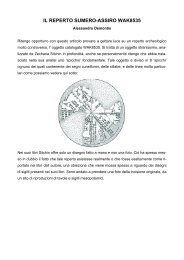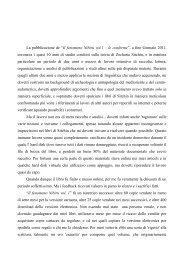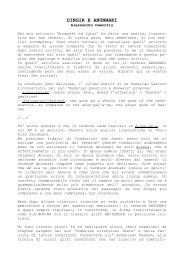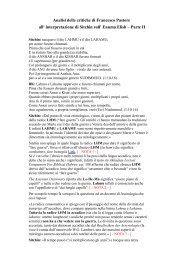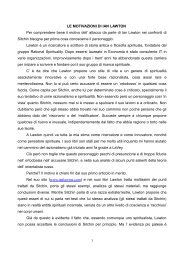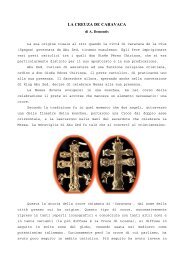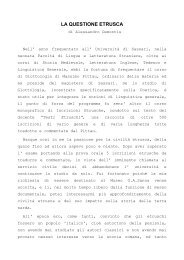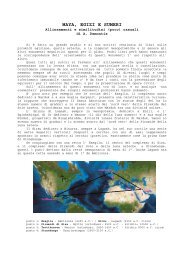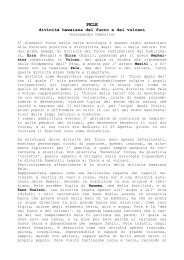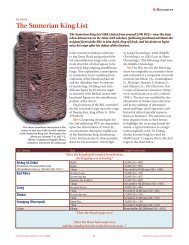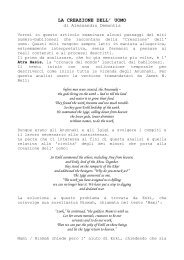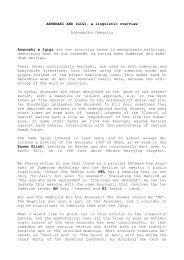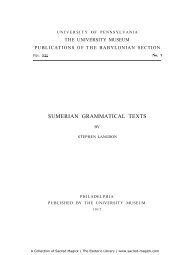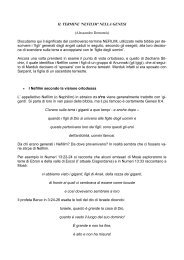Elementary Sumerian Glossary
Elementary Sumerian Glossary
Elementary Sumerian Glossary
Create successful ePaper yourself
Turn your PDF publications into a flip-book with our unique Google optimized e-Paper software.
nu(-u8)-gig (a kind of consecrated woman, often<br />
associated in some way with birthing) (qadištum,<br />
ištarītum); (conventionally "hierodule" as an epithet of<br />
Inanna) (Emesal mu-gib(GIG), mu-gi17(GIG)-ib)<br />
nu- (giš) kiri6(-k) orchardman, gardener (also with<br />
phonetic indicator in Ur III: nu- ki kiri6, nu-kiri6 ki )<br />
(Steinkeller, Sale Documents 168f.; Powell, ZA 62,<br />
190ff.) Sjöberg, AV Limet 128, argues this is not a<br />
genitive compound, but rather a form */nukarig/; cf.<br />
the g/b alternation in the loan nukaribbu.<br />
nu-mu(-un)-su, nu-ma(-nu)-su, na-ma-su widow<br />
Rdg. is conventional; newest reading is nu-mu(-un)kuš<br />
for which see Cavigneaux, RA 87, 111.<br />
nu-siki, nu-síg fatherless or homeless child, orphan,<br />
waif<br />
giš nu-úr-ma pomegranate (nurmû)<br />
nú(d), nux(SA4) to lie (down), go to bed; to lay down<br />
(e.g. traps, snares; see Sjöberg, AV Klein 297); to<br />
creep, slither Conventionally read ná. For the value<br />
nux see še21; see also Veldhuis, Education 284, who<br />
calls še21 "the inanimate complement of nú."<br />
giš nú bed Some read ĝiš-nú, but see BiOr 42, 20 for<br />
forms without a determinative, contra Steinkeller,<br />
OrAnt 19 (1980) 79 n. 1. The word occurs with and<br />
without determinative in Presargonic Lagaš texts, e.g.<br />
DP 490 i 1-2, ii 1, iv 5; DP 427 i 1-3.<br />
na4 nu11-gal → na4 ĝiš-nu11-gal,<br />
numun (i.e. nuĝun) seed; descendant (Civil, AV Biggs<br />
30)<br />
ú númun (a type of rush or sedge) (Civil, AV Biggs 30)<br />
NUN ku6 → agargara ku6<br />
nun noble, prince; princess (cf. Temple Hymns line<br />
82)<br />
nun(-na) princely, noble, preeminent, grand; loud<br />
nun-bé loudly<br />
nundum lip; lip or rim of a vessel<br />
nunuz egg<br />
nunuz - ĝar to lay eggs<br />
P<br />
pa branch, branches; stick<br />
pa-áĝ breath; nostril (Molina+, JNES 63, 7f.)<br />
pa-áĝ, pa-an → zi - pa-áĝ, za-pa-áĝ<br />
pa - è to come forth radiantly; to be/make resplendent,<br />
splendid; to make famous; periphrastic: pa-è - a5 to<br />
make resplendent<br />
pa-mušen(-na) feathers<br />
pa-pah cella; bedroom (Alster, AV Hallo 15 + n. 2)<br />
pa-sa-lá-a tied bundle of sticks<br />
pà(d) to come into view or consideration, be revealed;<br />
to reveal, show; to call (up), choose; to find, discover<br />
pa4, pa5 irrigation ditch (palgu)<br />
pa4, pap older brother, eldest son; forebear, "father"<br />
pa4/pa-bìl-ga grandfather; paternal uncle; ancestor<br />
gi pad (a kind of basket)<br />
pad(r) to break off a piece, chip off; to crumble, crush,<br />
destroy (PSD B now connects at least in some<br />
meanings with bu(r), q.v.)<br />
pad(r) portion, piece (see also šuku)<br />
túg pala1-3 (a divine or royal garment)<br />
palil(IGI.DU) foremost one (cf. igi-du)<br />
giš pan (rarely giš ba-na) bow (reading ban is obsolete,<br />
see Civil, JCS 55, 50f.)<br />
pàr-rim4 → bar-rim4<br />
pe-el to defile, spoil, dirty (lu''û)<br />
43



